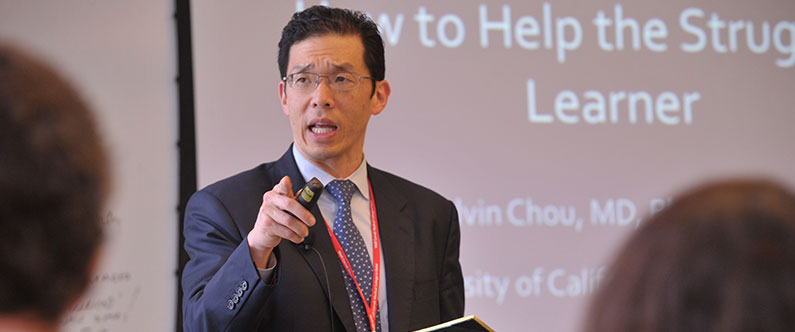WCM-Q symposium shares strategies for helping struggling learners
 The symposium was co-directed by Dr. Stephen Scott, associate dean for student affairs at WCM-Q, and Dr. Calvin Chou (pictured), professor of clinical medicine at the University of California, San Francisco.
The symposium was co-directed by Dr. Stephen Scott, associate dean for student affairs at WCM-Q, and Dr. Calvin Chou (pictured), professor of clinical medicine at the University of California, San Francisco.
Strategies for identifying and helping struggling learners were explored as teaching faculty, student counselors and college administrators met at WCM-Q to participate in the Remediation in Health Professions Education Symposium.
Through a series of interactive workshops, discussion groups and presentations, the two-day symposium sought to build on the skills and knowledge of professionals working in the medical education sector to help them assess learner needs, provide useful feedback to struggling students, build effective student support networks with colleagues and offer individualized solutions to students.
Coordinated by WCM-Q’s Division of Continuing Professional Development (CPD), the symposium was attended by healthcare education professionals from WCM-Q and several other healthcare education institutions from across Qatar. The participants engaged in lively discussion as they shared their experiences of helping struggling learners, placing particular emphasis on the need to be sensitive to the many different cultural attitudes to learning and achievement that exist among Qatar’s cosmopolitan population.
The symposium was co-directed by Dr. Stephen Scott, associate dean for student affairs at WCM-Q, and Dr. Calvin Chou, professor of clinical medicine at the University of California, San Francisco, who were also on the planning committee. WCM-Q faculty Dr. Gerardo Guiter, assistant professor of pathology and laboratory medicine; Dr. Lotfi Chouchane, professor of genetic medicine, professor of microbiology and assistant dean for the basic science curriculum; Dr. Kevin Smith, assistant dean for premedical education; and WCM-Q staff member Dr. Kelly Anne Nelson, director of student affairs, were also members of the planning committee and facilitated on the sessions. Dr. Scott said:
“The symposium gave us a great opportunity to hear from a diverse spectrum of educators about their approaches to remediation and their experiences with students who struggle in one or more areas. It has been immensely valuable for all of us to learn from each other’s perspectives and to be able to expand our repertoire of tools to identify challenges and effectively coach learners.
Additionally, forming connections across disciplines and institutions has illustrated that we are not alone, and that we have a community of educators to look to for support and encouragement.”
The symposium was the first event to be funded by a new CPD-administered awards program that has been developed to support innovative teaching initiatives among WCM-Q faculty as part of the Educators Across the Health Care Spectrum (EAHCS) series. Through a competitive, peer-reviewed application process, the Remediation in Health Professions Education Symposium was selected for the award. Dr. Chou said:
"As competency-based assessment takes hold throughout all levels of health professions education, educators are discovering that there is a dearth of experience when the assessment reveals someone who is struggling. Since healthcare remains a "problem-based" profession – which is appropriate as we must all look out for potential problems that may arise - when we meet a struggling learner, we think through similar subroutines of diagnosis and treatment. While this is a reasonable overall approach, it can also unnecessarily place learners who have excelled all their lives in new and uncomfortable positions of resolving failures.
The symposium successfully outlined the overall landscape of the remediation literature in health professions education, and developed skills, awareness, and community to help our learners most in need.”
The activity was planned and implemented in accordance with the accreditation requirement and policies of the Accreditation Council for Continuing Medical Education (ACCME) through the joint providership of Weill Cornell Medical College and Weill Cornell Medicine-Qatar. Weill Cornell Medical College designated the activity for a maximum of 10.5 AMA PRA Category 1 Credit(s)™.
During a session entitled Experiences of Mediation, the participants brainstormed the wide range of issues that could cause a student to require mediation. These included poor time-management skills, low self-esteem, poor sleeping habits, a tendency to ‘cram’ before tests rather than learning at a steady pace, poor research skills, resistance to help and anxiety about assessment. The session was presented by Dr. Kevin Smith, Kelly Anne Nelson, Dr. Chou and Dr. Scott.
Other sessions explained how to provide effective feedback, techniques for identifying the struggling learner, outcomes in remediation and enhancing student success within institutions.
Dr. Marcellina Mian, professor of pediatrics and associate dean of medical education at WCM-Q, presented a session on strategies to successfully guide students through the coaching and remediation process. She said:
“Remediation is a crucial part of education because it is a process by which students who have strayed from the path of success can be brought back towards achieving their goals. The challenge is that every student is unique. For example, a student might be reluctant to admit that he or she is having difficulty and will be resistant to accepting help, or the problem could be any number of personal issues.
As educators we need to have the skills to diagnose the problem and devise and implement effective strategies to help the student get back on track.”